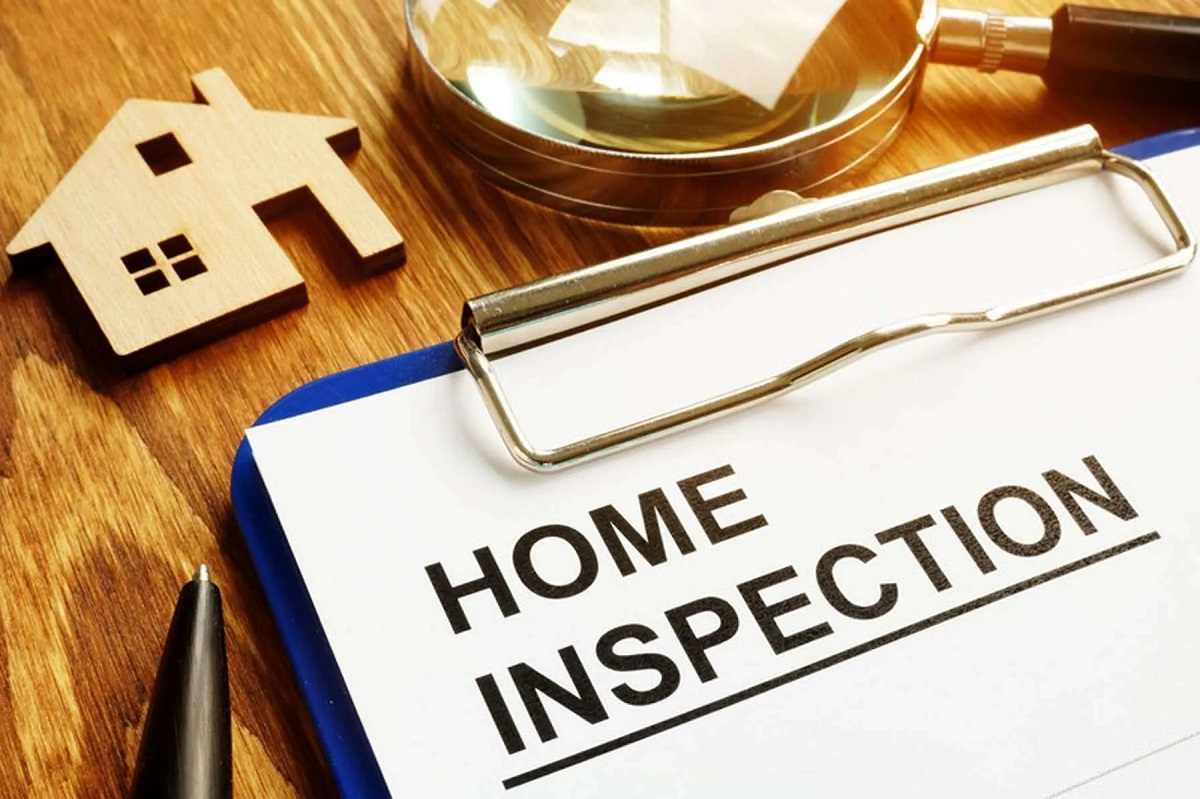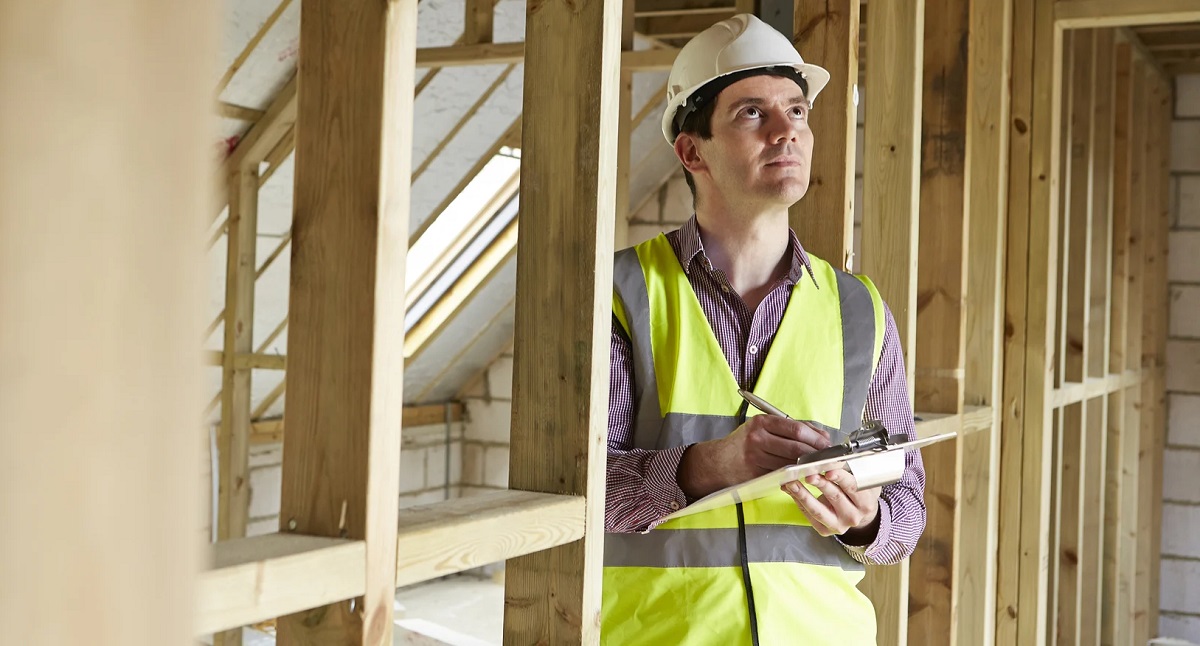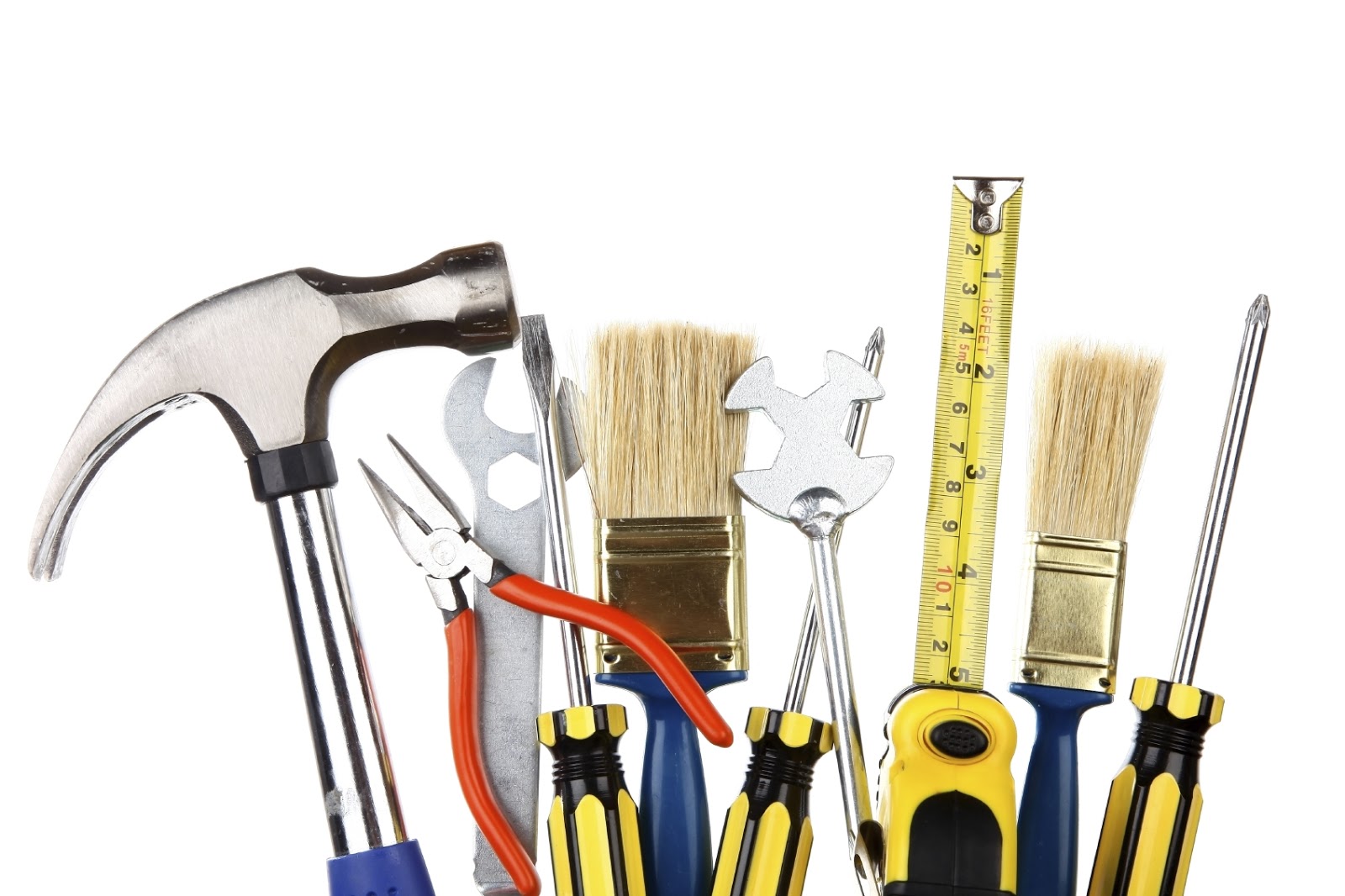Home>Home Maintenance>First-Time Home Buyer Guide: How To Order An Inspection


Home Maintenance
First-Time Home Buyer Guide: How To Order An Inspection
Modified: March 24, 2024
Looking to buy your first home? Our comprehensive guide will walk you through the process of ordering a home inspection, ensuring proper home maintenance.
(Many of the links in this article redirect to a specific reviewed product. Your purchase of these products through affiliate links helps to generate commission for Storables.com, at no extra cost. Learn more)
Introduction
Purchasing your first home is an exciting milestone in life, but it can also be overwhelming and filled with uncertainties. One crucial step in the home-buying process is ordering a home inspection. A home inspection is a thorough examination of the property to assess its condition and identify any potential issues that may need attention or repairs. Understanding the importance of a home inspection and how to navigate the inspection process is crucial for first-time homebuyers.
In this comprehensive guide, we will walk you through the step-by-step process of ordering a home inspection and provide useful tips on how to make the most of this vital stage of the home-buying journey.
By gaining a solid understanding of home inspections and following these steps, you will be well-equipped to make informed decisions about your first home purchase and ensure that you are investing in a property that meets your expectations and is safe for you and your family.
Key Takeaways:
- Ordering a home inspection is crucial for first-time homebuyers to uncover hidden issues, prioritize safety, and gain negotiation power, ensuring a sound investment and peace of mind.
- By actively participating in the inspection process, negotiating repairs, and moving forward with confidence, first-time homebuyers can celebrate becoming homeowners and enjoy their new space.
Step 1: Understanding the Importance of Home Inspections
Before diving into the specifics of ordering a home inspection, it’s essential to understand why this step is so crucial in the home-buying process. A home inspection provides you with a comprehensive assessment of the property’s condition, helping you make an informed decision and avoid potential unpleasant surprises down the line.
Here are a few reasons why home inspections are important:
- Uncover hidden issues: A home inspection allows you to identify any hidden issues or potential problems that may not be apparent during a casual viewing. Professionals will thoroughly inspect the structure, systems, and major components of the property to highlight any underlying concerns such as plumbing issues, electrical problems, roofing defects, or structural damage.
- Prioritize safety: Ensuring the safety of your family is paramount. A home inspection helps identify safety hazards, such as faulty wiring, mold, or carbon monoxide leaks. By addressing these issues early on, you can take the necessary steps to safeguard your loved ones and prevent future accidents or health risks.
- Negotiating power: The findings from a home inspection report can provide valuable leverage when negotiating the purchase price. If significant issues are discovered, you can request repairs or negotiate a lower price to account for the necessary fixes. This can save you money in the long run and ensure you are making a sound investment.
- Long-term planning: A thorough home inspection report not only helps you make an informed decision about the purchase but also provides insights into any future maintenance or repairs that may be needed. This information can guide your long-term planning and budgeting for the property.
- Peace of mind: Knowing the condition of the property and having a professional assessment instills confidence in your purchase. It offers peace of mind, eliminating potential anxieties about the property’s integrity and allowing you to move forward with the purchase with confidence.
Now that we understand the importance of home inspections, let’s move on to the next step: researching and hiring a qualified home inspector.
Step 2: Researching and Hiring a Qualified Home Inspector
Once you recognize the significance of a home inspection, the next step is to find and hire a qualified home inspector. Here are some tips to help you in your search:
- Ask for recommendations: Start by asking friends, family, or your real estate agent for recommendations. They may have worked with reputable home inspectors in the past and can provide valuable insights.
- Check qualifications and credentials: Look for licensed and certified home inspectors who are members of respected professional organizations, such as the American Society of Home Inspectors (ASHI) or the International Association of Certified Home Inspectors (InterNACHI). These organizations often have strict standards and requirements for their members.
- Read reviews and testimonials: Take the time to read online reviews and testimonials from previous clients. This can give you an idea of the inspector’s professionalism, thoroughness, and overall satisfaction level of their services.
- Inquire about their experience: Ask about the inspector’s experience in the industry. Ideally, you want someone with a proven track record and a deep understanding of home construction and systems.
- Interview potential inspectors: Consider conducting interviews or phone consultations with a few potential inspectors. This will give you the opportunity to ask questions regarding their process, what they include in their inspections, and how they communicate their findings.
- Compare pricing: While cost shouldn’t be the sole determining factor, it’s essential to understand each inspector’s pricing structure. Compare quotes, keeping in mind that a thorough inspection may cost slightly more but can potentially save you money in the long run by uncovering any hidden issues.
- Request sample reports: Ask for sample inspection reports to understand how detailed and easy to understand their reports are. A comprehensive report with clear explanations, accompanied by photos, is crucial for your understanding and future reference.
By conducting thorough research and hiring a qualified home inspector, you can ensure that you receive a comprehensive and accurate assessment of the property’s condition. This sets the foundation for the successful completion of the home-buying process.
Now that you have identified a potential home inspector, it’s time to move on to the next step: preparing for the inspection.
Step 3: Preparing for the Inspection
As the inspection day approaches, there are several steps you can take to prepare for a smooth and productive home inspection:
- Notify the seller: Inform the seller of your intention to conduct a home inspection. This allows them to prepare the property and ensure it is accessible for the inspector.
- Arrange a convenient time: Coordinate with the seller and the inspector to find a mutually convenient time for the inspection. It’s advisable for you, the seller, and the inspector to be present during the inspection to address any questions or concerns that may arise.
- Compile relevant documents: Gather important documents related to the property, such as any home warranty information, maintenance records, and renovation permits. These documents can provide valuable insights into the history of the property and assist the inspector in their assessment.
- Clear access to all areas: Ensure that the inspector has unobstructed access to all areas of the property, including attics, basements, crawl spaces, mechanical rooms, and any locked areas. Clear away any clutter or personal belongings that may impede the inspection process.
- Make a checklist of concerns: Prior to the inspection, make a list of specific areas or issues you would like the inspector to pay extra attention to. This can include concerns based on your own observations during previous visits to the property.
- Prepare a list of questions: Have a list of questions ready for the inspector. This could be related to the maintenance of specific systems, any potential red flags, or recommendations for future improvements.
- Bring a notepad and camera: During the inspection, take notes on any important findings or recommendations mentioned by the inspector. It’s also helpful to take photos as visual documentation to refer back to after the inspection.
By preparing for the inspection ahead of time, you create an environment that allows the home inspector to conduct a thorough evaluation, ensuring that no areas go overlooked and that you receive comprehensive feedback.
Now that you are prepared for the inspection, let’s move on to the next step: attending the inspection.
Step 4: Attending the Inspection
Attending the home inspection is highly recommended as it provides you with an opportunity to gain firsthand knowledge about the property’s condition and ask any questions you may have. Here are some tips to make the most of attending the inspection:
- Arrive on time: Be punctual and arrive at the property on time to meet the home inspector.
- Dress appropriately: Wear comfortable clothing and shoes that you don’t mind getting dirty or wet, as you may need to access different areas of the property during the inspection.
- Bring your checklist and questions: Refer to your checklist of concerns and questions you prepared before the inspection. This will ensure that you cover all the areas of interest.
- Observe and ask questions: Pay close attention to the inspector’s observations and ask questions along the way. This will help you gain a better understanding of any issues or maintenance requirements identified during the inspection.
- Learn about the property’s systems: Take the opportunity to familiarize yourself with the property’s systems, such as the HVAC system, electrical panel, plumbing, and other components. Ask the inspector to explain how these systems work and any maintenance tips.
- Take notes and photos: Use your notepad to jot down important information and recommendations provided by the inspector. Additionally, take photos of any areas of concern or items that require attention for future reference.
- Keep an open mind: While you may have certain expectations for the property, be open to the inspector’s findings. Remember, the purpose of the inspection is to identify potential issues that may not be apparent to the naked eye.
- Respect the inspector’s space: Allow the inspector space to work and refrain from distracting them. However, feel free to ask questions and request clarification whenever needed.
Attending the inspection enables you to gain valuable insights into the property’s condition and address any concerns directly with the inspector. It’s a chance to learn more about the property and make an informed decision about moving forward with the purchase.
Now that you’ve attended the inspection, it’s time to move on to the next step: reviewing the inspection report.
Tip: When ordering a home inspection, make sure to hire a certified and experienced inspector. Ask for a detailed report and be present during the inspection to ask questions and address any concerns.
Step 5: Reviewing the Inspection Report
After the home inspection is complete, the inspector will provide you with a detailed inspection report. This report is a comprehensive summary of their findings and recommendations regarding the property. Here’s how to effectively review the inspection report:
- Read through the report carefully: Take the time to read the report thoroughly. Pay close attention to any significant issues or safety concerns identified by the inspector.
- Understand the terminology: Familiarize yourself with any technical terms or industry jargon used in the report. If you come across any unfamiliar terms, don’t hesitate to ask the inspector for clarification.
- Prioritize the findings: Focus on the major issues outlined in the report. These are the areas that should be addressed with immediate attention, as they may impact the safety, livability, or structural integrity of the property.
- Consider the overall condition of the property: Look beyond the major issues and evaluate the overall condition of the property. Take note of any recommended maintenance or repairs that may be necessary in the near future.
- Consult with professionals if needed: If the inspection report reveals significant issues that require specialized expertise, consider consulting with relevant professionals such as electricians, plumbers, or structural engineers. They can provide further insights and recommendations.
- Ask the inspector for clarification: If you have any questions or need further explanation about the findings in the report, don’t hesitate to reach out to the inspector. They are usually available to provide additional clarification or address any concerns you may have.
- Take action: Once you have reviewed the inspection report, it’s time to decide on the necessary course of action. You can renegotiate the purchase price, request repairs, or reassess whether the property meets your expectations and budget.
Reviewing the inspection report is a crucial step in the home-buying process as it provides you with a comprehensive understanding of the property’s condition. By carefully considering the findings and recommendations, you can make informed decisions and move forward confidently.
Now that you have reviewed the inspection report, let’s move on to the next step: negotiating repairs and renegotiating the price.
Step 6: Negotiating Repairs and Renegotiating Price
Upon reviewing the inspection report, you may uncover significant issues that require repairs or renovations. This step involves negotiating with the seller to address these concerns and potentially renegotiating the purchase price. Here’s how to navigate this process:
- Identify priority repairs: Determine which repairs are necessary for the safety and integrity of the property. Focus on addressing these issues first during the negotiation process.
- Get repair estimates: Obtain estimates from qualified contractors or specialists for the repairs identified. This will help you understand the potential costs involved and provide supporting documentation for negotiation purposes.
- Discuss with the seller: Initiate a conversation with the seller or their representative to discuss the identified repairs and your concerns. Clearly communicate your expectations and present the supporting documentation for reference.
- Consider alternative solutions: If the seller is unwilling or unable to make the requested repairs, explore alternative solutions such as receiving a credit towards the closing costs or lowering the purchase price to offset the cost of repairs.
- Negotiate a fair outcome: Work towards a mutually acceptable resolution with the seller. Keep in mind that negotiation involves give and take, so be prepared to meet halfway on certain requests or consider concessions in other areas.
- Document the agreed-upon changes: Once an agreement is reached, ensure that all negotiated repairs or changes are documented in writing, either as an addendum to the purchase agreement or in a separate agreement. This will provide clarity and protect both parties’ interests.
- Canvass for professionals: If repairs are required, source reputable contractors or specialists to carry out the necessary work. Obtain multiple quotes to ensure fair pricing and quality workmanship.
Remember, negotiation is a normal part of the home-buying process. It’s important to approach the negotiation process respectfully and with an open mind to reach a fair outcome for all parties involved.
Now that repairs and pricing adjustments have been negotiated, it’s time to move forward with the purchase in the final step: Step 7: Moving Forward with the Purchase.
Step 7: Moving Forward with the Purchase
Congratulations! You have successfully navigated through the home inspection process and negotiated repairs or pricing adjustments. Now, it’s time to move forward with confidence and complete the purchase of your new home. Here are the final steps:
- Review the updated terms: Take a careful look at the updated terms of the purchase agreement, including any agreed-upon repairs or modifications. Ensure that all the changes are accurately reflected and align with your expectations.
- Secure financing: If you haven’t already done so, finalize your financing arrangements. Consult with your lender, provide the necessary documents, and complete any remaining paperwork to secure your loan.
- Schedule a final walkthrough: Prior to closing, schedule a final walkthrough of the property to ensure that all agreed-upon repairs have been completed satisfactorily. This gives you the chance to verify that the property is in the agreed-upon condition before proceeding with the purchase.
- Coordinate with your real estate agent: Work closely with your real estate agent to ensure a smooth and timely closing process. They will guide you through the necessary steps, such as scheduling the closing date, reviewing closing documents, and coordinating with all parties involved.
- Attend the closing: On the designated closing date, attend the closing meeting with your agent, the seller, and any necessary parties, such as the lender or title company. Review and sign all the necessary paperwork to complete the purchase.
- Secure homeowner’s insurance: Prior to closing, arrange for homeowner’s insurance to protect your investment. Provide the necessary information to the insurance provider and ensure that the policy is effective from the closing date.
- Celebrate and settle in: Congratulations! You are now a homeowner. Take some time to celebrate your accomplishment and start settling into your new home. Plan your move, schedule necessary renovations or improvements, and make the space truly your own.
By following these final steps, you can smoothly transition from the home inspection process to becoming a proud homeowner. Remember to stay organized, communicate effectively with all parties involved, and be prepared for any necessary paperwork or tasks.
Now, enjoy your new home and embrace the next chapter of your life!
If you require any further assistance or have any additional questions, don’t hesitate to reach out to your real estate agent or other professionals involved in the home-buying process.
Conclusion
Ordering a home inspection is a crucial step for first-time homebuyers to ensure they are making a sound investment and safeguarding the well-being of their loved ones. By understanding the importance of home inspections and following the step-by-step guide outlined in this article, you have gained the knowledge and tools needed to navigate the inspection process successfully.
Throughout this guide, we have emphasized the significance of home inspections in uncovering hidden issues, prioritizing safety, and providing you with negotiation power. By conducting thorough research and hiring a qualified home inspector, you can gain a comprehensive understanding of the property’s condition and make informed decisions.
Preparing for the inspection, attending the inspection, and reviewing the inspection report enable you to actively participate in the assessment process, ask questions, and address any concerns directly. This hands-on approach empowers you to negotiate repairs and pricing adjustments, ensuring that the property meets your expectations and aligns with your budget.
Finally, moving forward with the purchase includes reviewing the updated terms, securing financing, conducting the final walkthrough, and attending the closing. These final steps cement your journey as a homeowner and mark the beginning of an exciting new chapter in your life.
Remember, the home-buying process can be overwhelming at times, but by arming yourself with knowledge and working with trusted professionals, you can navigate each step with confidence. Celebrate your accomplishment, settle into your new home, and enjoy the sense of pride and security that comes with homeownership.
If you have any further questions or require assistance, don’t hesitate to reach out to your real estate agent or other professionals involved in the home-buying process. They are there to support you and ensure a smooth and successful transition into your new home.
Frequently Asked Questions about First-Time Home Buyer Guide: How To Order An Inspection
Was this page helpful?
At Storables.com, we guarantee accurate and reliable information. Our content, validated by Expert Board Contributors, is crafted following stringent Editorial Policies. We're committed to providing you with well-researched, expert-backed insights for all your informational needs.















0 thoughts on “First-Time Home Buyer Guide: How To Order An Inspection”